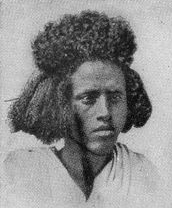Ansar (Mahdi Uprising)
As Ansār ( Arabic أنصار, DMG anṣār 'helper') was the name given to the followers of Muhammad Ahmad during the Mahdi uprising in Sudan from 1881 to 1899. This name is based on the name of the supporters of the Prophet Mohammed from Medina (see: Ansār ). Originally they were called dervishes ( darāwīsch ; Sg. Darwīsch ), but Muhammad Ahmad forbade the use of this name, as it meant "madmen" in the Sudan colloquial language. In western sources, especially in contemporary ones, this term was used. Another earlier name was Fuqarā ("arms"). Those followers who accompanied Muhammad Ahmad on the Hijra from Aba to Gedir or who joined him in Gedir were also referred to as Muhādschirīn ("emigrants") in parallel to the Prophet Mohammed .

Factions
The Ansār consisted of three interest groups, the commonality of which was the rejection of the Egyptian administration. During the Mahdi uprising, they formed factions with representatives appointed by Muhammad Ahmad. These representatives were given the title of caliph and were given the supreme command of a standing warrior army ( al-Rayya , "flag") and a division of jihadiyya (regular riflemen). The division of the Ansār was particularly evident in the internal power struggles after the death of Muhammad Ahmad.
The original core, the Abkār al-Mahdī ("firstborn of the Mahdi"), was formed from supporters who joined the movement out of religious conviction and who rejected the Egyptian administration as heretical . This group was represented by Ali bin Muhammad Hilu . Their army called itself the "Green Flag" ( al-Rayya al-Khadra ) and was recruited from tribes ( Kināna and Dighaym ) based in Jazira . It was politically and militarily the weakest faction and acted as a mediator between the other, rival factions during internal power struggles.
The Awlād al-balad ("Sons of the Land") were those people who rejected Egyptian rule out of commercial interests and joined the Mahdi movement. Above all, they were merchants who descended from the tribes of northern Sudan near the Nile (mainly Jaliyin and Danaqla ) and who saw themselves hindered in their business by the Egyptian administration, especially by the suppression of the slave trade. This group was led by relatives of Muhammad Ahmad ( Ashraf ). This group was represented by Muhammad Sharif bin Hamid , a son-in-law of Muhammad Ahmad. Their army called itself the "Red Flag" ( al-Rayya al-Hamra ), which in fact was divided into different armies and each commanded by emirs (e.g. Wad al-Najumi , Mahmud Abd al-Qadir , Muhammad Khalid ) . The Ashraf formed the most influential group during the reign of Muhammad Ahmad, but lost the power struggle against Abdallahi bin Muhammad.
The third faction was formed by the Baggara tribes from West Sudan , especially the Taischa tribes . They joined the Mahdi movement to free themselves from the ban on raids and the tax burden imposed by the Egyptian administration. This group was led by Abdallahi bin Muhammad . His army, numerically the largest of all factions, called itself the "Black Flag" ( al-Rayya al-Zarqa ). Abdallahi bin Muhammad and his faction prevailed against the Ashraf and Awlād al-balad in the power struggle after the death of Muhammad Ahmad .
Appearance
The Mahdi established the jibba as the typical clothing of his followers. He wanted to act against the spread of the penchant for luxury . The jibba consisted of a knee-length white shirt, ankle-length trousers and a turban. Holes were mended with patches.
Ansar today
The movement founded by the Mahdi has around three million followers in Sudan today. Associated with the Ansar movement is the National Ummah Party . This was founded by Muhammad Ahmad's son Abd al-Rahman al-Mahdi in February 1945. His grandson and great-grandson, Muhammad Ahmad's Sadiq al-Mahdi, is today the chairman of the Umma party and was twice prime minister of the country.
See also
Individual evidence
- ↑ PM Holt: The Mahdist State in the Sudan 1881-1898: A study of its origins, development and overthrow. Oxford University Press, 1958, pp. 106 .
- ↑ PM Holt: The Mahdist State in the Sudan 1881-1898: A study of its origins, development and overthrow. Oxford University Press, 1958, pp. 117-119.
- ^ PM Holt: A Modern History of the Sudan . Weidenfeld and Nicolson, 1961, ISBN 0-297-74748-7 , pp. 92-93.
- ↑ Wilfried Westphal: Storm over the Nile: The Mahdi uprising . Parkland-Verlag, 2002, ISBN 3-89340-025-7 , pp. 253-254.
